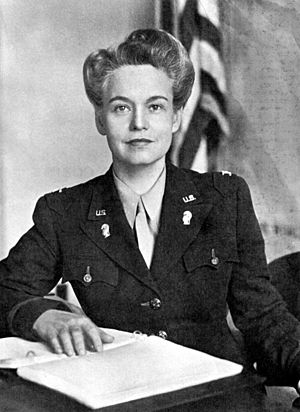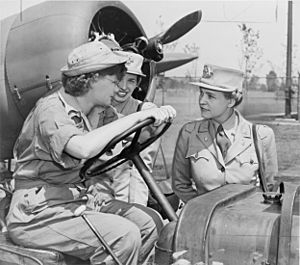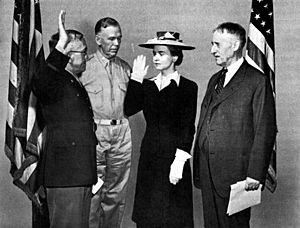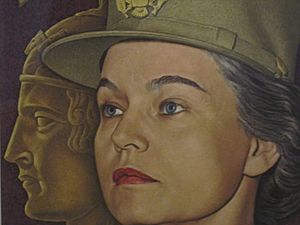Oveta Culp Hobby facts for kids
Quick facts for kids
Oveta Culp Hobby
|
|
|---|---|
 |
|
| 1st United States Secretary of Health, Education, and Welfare | |
| In office April 11, 1953 – July 31, 1955 |
|
| President | Dwight D. Eisenhower |
| Preceded by | Herself (Federal Security Agency Administrator) |
| Succeeded by | Marion B. Folsom |
| Administrator of the Federal Security Agency | |
| In office January 20, 1953 – April 11, 1953 |
|
| President | Dwight D. Eisenhower |
| Preceded by | Oscar Ewing |
| Succeeded by | Herself (Health, Education and Welfare Secretary) |
| Personal details | |
| Born |
Oveta Culp
January 19, 1905 Killeen, Texas, U.S. |
| Died | August 16, 1995 (aged 90) Houston, Texas, U.S. |
| Political party | Republican (since 1953) |
| Other political affiliations |
Democratic (before 1953) |
| Spouse |
William P. Hobby
(m. 1931; died 1964) |
| Children | 2, including William Jr. |
| Education | Mary Hardin Baylor College South Texas College of Law University of Texas at Austin |
| Military service | |
| Allegiance | |
| Branch/service | |
| Years of service | 1941–1945 |
| Rank | |
| Commands | Women's Army Auxiliary Corps (later the Women's Army Corps) |
| Battles/wars | World War II |
| Awards | |

Oveta Culp Hobby (born January 19, 1905 – died August 16, 1995) was an important American leader. She worked in government and business. She became the first ever Secretary of Health, Education, and Welfare from 1953 to 1955. She was a member of the Republican Party.
Oveta Culp Hobby was also the second woman in history to be part of a President's Cabinet. Before that, she was the first director of the Women's Army Corps (WAC) during World War II. She also worked as an editor, publisher, and board chair for the Houston Post newspaper. President Dwight D. Eisenhower asked her to join his team. She first led the Federal Security Agency, which later became a new government department. This new department was called the Department of Health, Education, and Welfare, and Oveta Culp Hobby became its very first leader.
Contents
Early Life and Education
Oveta Culp was born on January 19, 1905, in Killeen, Texas. Her father, Isaac William Culp, was a lawyer and politician. Her mother was Emma Elizabeth Hoover.
She went to Mary Hardin Baylor College for Women for a short time. She also took law classes at South Texas College of Law and Commerce. Later, she studied law at the University of Texas Law School. However, she did not officially enroll or get a degree from any of these schools.
When she was 21, she worked for the Texas House of Representatives. She helped make sure meetings followed the rules. In 1930, she tried to become a legislator herself but was not successful. In 1931, at age 26, she started her career in journalism.
War Service and the WAC
During World War II, Oveta Culp Hobby played a big role. She first worked for the War Department. Then, she became the director of the Women's Army Auxiliary Corps (WAAC). This group was later renamed the Women's Army Corps (WAC). The WAC was created to help the Army because there weren't enough men available.
On July 5, 1943, she became a colonel in the U.S. Army. The women in the WAC were the first women, besides nurses, to wear U.S. Army uniforms. They also received military benefits, like those from the GI Bill. Hobby worked hard to make the WAC a strong part of the military. She wanted to protect its image and make sure it was seen in a good way.
She made the rules for joining the WAC stricter. She also created a special Code of Conduct for WAC members. This helped make the WAC a well-respected and high-quality organization. Her experience with public relations helped her understand how important the media's view was. For her efforts during the war, she received the Distinguished Service Medal. She was the first woman in the Army to get this important award.
Leading in Government
After the war, Oveta Culp Hobby joined President Dwight D. Eisenhower's team in 1953. She was first put in charge of the Federal Security Agency. This was not yet a Cabinet position, but she was invited to attend Cabinet meetings.
Soon after, on April 11, 1953, she made history. She became the first secretary and the first woman to lead the new Department of Health, Education, and Welfare (HEW). This department later became the Department of Health and Human Services. This was the second time she helped set up a new government agency.
One of her most important decisions at HEW was to approve Jonas Salk's polio vaccine. This vaccine helped protect many people from the serious disease polio. She also tried to change how Social Security taxes worked, but she faced a lot of disagreement.
She left her position in 1955. At that time, there were some disagreements about the polio vaccine. After leaving government, she went back to Houston. She returned to her role at the Houston Post as president and editor. She also took care of her husband, who was ill. She served on many boards and advised different groups across the country. Many universities, like Columbia University and the University of Pennsylvania, gave her honorary degrees. President Eisenhower even suggested she run for president in 1960, but she decided not to.
Family Life
In 1931, Oveta Culp married William P. Hobby. He was an editor and later owned the Houston Post newspaper. He had also served as the 27th governor of Texas from 1917 to 1921. They had two children together.
She started working on the editorial team at the Post. Over the years, she became the newspaper's executive vice president, then its president, and finally its publisher and co-owner with her husband. In 1938, when she became vice president, she made sure that news for women got more attention in the paper.
Oveta Culp Hobby and her husband were originally part of the Democratic Party. However, they became unhappy with the party in the 1930s. They felt that President Franklin D. Roosevelt's social programs had gone too far. After World War II, Hobby worked to encourage Democratic voters to support Republican presidential candidates.
She passed away from a stroke in 1995 in Houston. She was buried at Glenwood Cemetery.
Her son, William P. Hobby, Jr., served as the lieutenant governor of Texas for many years, from 1973 to 1991. Her daughter, Jessica, was married to Henry E. Catto, Jr., who was a U.S. Ambassador. Jessica was also an activist for environmental causes.
Legacy and Honors
Oveta Culp Hobby is remembered in many ways:
- The library at Central Texas College is named after her.
- A dormitory (a building where students live) at Texas A&M University is named after her.
- The Oveta Culp Hobby Soldier & Family Readiness Center at Fort Hood, Texas is named in her honor.
- An elementary school in Killeen, Texas is named after her.
- In 2011, the U.S. Post Office released a special stamp to honor her.
- A building at the Peaceable Kingdom (Children's Retreat Center) in Killeen, Texas, is named after her.
- A special award from the Department of Health, Education and Welfare was named in her honor. It recognized people who showed great dedication to their work.
- In 1996, Hobby was added to the National Women's Hall of Fame.
- On December 7, 2021, a painting of her in her military uniform was placed in the Killeen Main Library.
- The Education Center at the National Museum of the Pacific War in Fredericksburg, Texas is named for her.
See also
 In Spanish: Oveta Culp Hobby para niños
In Spanish: Oveta Culp Hobby para niños
- List of female United States Cabinet members
 | Toni Morrison |
 | Barack Obama |
 | Martin Luther King Jr. |
 | Ralph Bunche |



